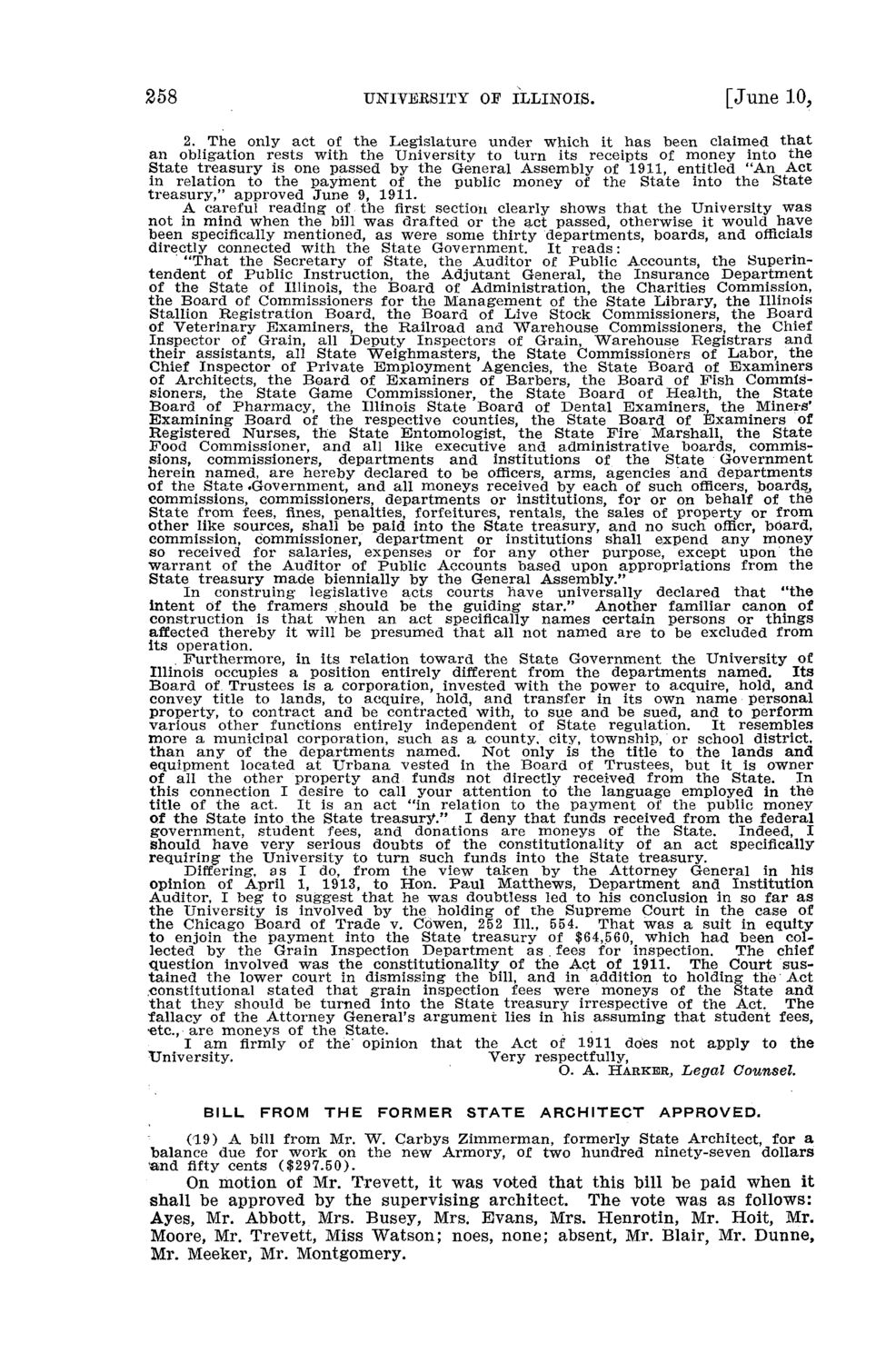| |
| |
Caption: Board of Trustees Minutes - 1914
This is a reduced-resolution page image for fast online browsing.

EXTRACTED TEXT FROM PAGE:
258 UNIVERSITY or ILLINOIS. [June 10, 2. The only act of the Legislature under which it has been claimed that an obligation rests with the University to turn its receipts of money into the State treasury is one passed by the General Assembly of 1911, entitled "An Act in relation to the payment of the public money of the State into the State treasury," approved June 9, 1911. A careful reading of the first section clearly shows that the University was not in mind when the bill was drafted or the act passed, otherwise it would have been specifically mentioned, as were some thirty departments, boards, and officials directly connected with the State Government. It reads: "That the Secretary of State, the Auditor of Public Accounts, the Superintendent of Public Instruction, the Adjutant General, the Insurance Department of the State of Illinois, the Board of Administration, the Charities Commission, the Board of Commissioners for the Management of the State Library, the Illinois Stallion Registration Board, the Board of Live Stock Commissioners, the Board of Veterinary Examiners, the Railroad and Warehouse Commissioners, the Chief Inspector of Grain, all Deputy Inspectors of Grain, Warehouse Registrars and their assistants, all State Weighmasters, the State Commissioners of Labor, the Chief Inspector of Private Employment Agencies, the State Board of Examiners of Architects, the Board of Examiners of Barbers, the Board of Pish Commissioners, the State Game Commissioner, the State Board of Health, the State Board of Pharmacy, the Illinois State Board of Dental Examiners, the Miners' Examining Board of the respective counties, the State Board of Examiners of Registered Nurses, the State Entomologist, the State Fire Marshall, the State Food Commissioner, and all like executive and administrative boards, commissions, commissioners, departments and institutions of the State Government herein named, are hereby declared to be officers, arms, agencies and departments of the State .Government, and all moneys received by each of such officers, boards, commissions, commissioners, departments or institutions, for or on behalf of the State from fees, fines, penalties, forfeitures, rentals, the sales of property or from other like sources, shall be paid into the State treasury, and no such officr, board, commission, commissioner, department or institutions shall expend any money so received for salaries, expenses or for any other purpose, except upon the warrant of the Auditor of Public Accounts based upon appropriations from the State treasury made biennially by the General Assembly." In construing legislative acts courts have universally declared that "the intent of the framers should be the guiding star." Another familiar canon of construction is that when an act specifically names certain persons or things affected thereby it will be presumed that all not named are to be excluded from its operation. , Furthermore, in its relation toward the State Government the University of Illinois occupies a position entirely different from the departments named. Its Board of Trustees is a corporation, invested with the power to acquire, hold, and convey title to lands, to acquire, hold, and transfer in its own name personal property, to contract and be contracted with, to sue and be sued, and to perform various other functions entirely independent of State regulation. It resembles more a municipal corporation, such as a county, city, township, or school district, than any of the departments named. Not only is the title to the lands and equipment located at Urbana vested in the Board of Trustees, but it is owner of all the other property and funds not directly received from the State. In this connection I desire to call your attention to the language employed in the title of the act. It is an act "in relation to the payment of the public money of the State into the State treasury." I deny that funds received from the federal government, student fees, and donations are moneys of the State. Indeed, I should have very serious doubts of the constitutionality of an act specifically requiring the University to turn such funds into the State treasury. Differing, as I do, from the view taken by the Attorney General in his opinion of April 1, 1913, to Hon. Paul Matthews, Department and Institution Auditor, I beg to suggest that he was doubtless led to his conclusion in so far as the University is involved by the holding of the Supreme Court in the case of the Chicago Board of Trade v. Cowen, 252 111., 554. That was a suit in equity to enjoin the payment into the State treasury of $64,560, which had been collected by the Grain Inspection Department as . fees for inspection. The chief question involved was the constitutionality of the Act of 1911. The Court sustained the lower court in dismissing the bill, and in addition to holding the Act constitutional stated that grain inspection fees were moneys of the State and that they should be turned into the State treasury irrespective of the Act. The fallacy of the Attorney General's argument lies in his assuming that student fees, etc., are moneys of the State. I am firmly of the' opinion that the Act of 1911 does not apply to the University. Very respectfully, O. A. HARKER, Legal Counsel. BILL FROM THE FORMER STATE ARCHITECT APPROVED. (19) A bill from Mr. W. Carbys Zimmerman, formerly State Architect, for a balance due for work on the new Armory, of two hundred ninety-seven dollars 'and fifty cents ($297.50). On motion of Mr. Trevett, it was voted that this bill be paid when it shall be approved by the supervising architect. The vote was as follows: Ayes, Mr. Abbott, Mrs. Busey, Mrs. Evans, Mrs. Henrotin, Mr. Hoit, Mr. Moore, Mr. Trevett, Miss Watson; noes, none; absent, Mr. Blair, Mr. Dunne, Mr. Meeker, Mr. Montgomery.
| |